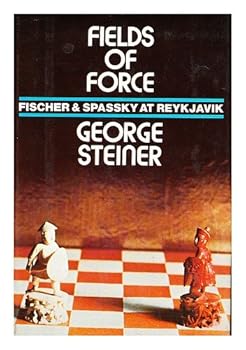Fields of Force
A brilliant overview of the Fischer-Spassky championship chess match of 1972. This description may be from another edition of this product.
Format:Hardcover
Language:English
ISBN:0670311782
ISBN13:9780670311781
Release Date:June 1974
Publisher:Viking Books
Length:86 Pages
Weight:1.30 lbs.
Customer Reviews
3 ratings
Volcanic personalities in a volcanic setting
Published by Thriftbooks.com User , 18 years ago
George Steiner is a critic whose reputation is the subject of considerable controversy, chiefly over the question of whether he knows as much as he leads his readers to believe he does. He is, as well, the author of the cringe-inducing novel, The Portage to San Cristobel of A.H., in which he, one assumes accidentally, makes Adolph Hitler something of a sympathetic character. This book, which he appears to be long out of print, is rather a curiosity, but one that invokes both these controversies at least tangentially. Published as The Sporting Scene: White Knights of Reykjavik in Britain, it collects Mr. Steiner's New Yorker coverage of the notorious Fischer/Spassky World Chess Championship of 1972. The author does manage to give the impression that he knows more about chess than any man who's ever lived, and that Fischer and Spassky would have been hard pressed to beat him. He is also, understandably, fascinated by the horrible behavior, cheap gamesmanship, egomania, and greed of Bobby Fischer. It could not have been known at the time just how disturbed Mr. Fischer really was--or perhaps he was not yet truly insane--but reading about him in retrospect it's clear that everyone, including Mr. Steiner, cut him way too much slack. It is sort of creepy to watch as Mr. Fischer, an exploiter himself, is exploited for his entertainment value even as alarms should have been going off somewhere about how unbalanced his mind was. At any rate, the book succeeds as sports reportage, capturing the manic nature of the confrontation, the Cold War atmospherics surrounding it, and something of the tortured personality of Bobby Fischer. It's richly illustrated with game positions, but an appendix with notations of the actual games would have been useful. David Edmonds and John Eidinow wrote Bobby Fischer Goes to War: How the Soviets Lost the Most Extraordinary Chess Match of All Time just a couple years ago and it has probably supplanted this book's place as regards the topic, but this one still seems worth reading if for no other reason that Mr. Steiner was there to experience the tumultuous match personally.
Interesting account of what happened in Reyjavik
Published by Thriftbooks.com User , 20 years ago
The author describes the politics and tantrums by both players (mostly Fischer) before and during the 1972 Chess World Championship. Before going through these events, the book focuses on the past champions and makes the argument that all of them where "crazy" in some form or other. Fischer is described as a despicable person who plays almost perfect chess. Bobby was a racist (neo-nazi), paranoid, anarchyst who thought everyone was against him and that he should not be held by the same rules that applied to eveyone else. One clear example of this is that through his constant complaints about soviet players agreeing to quick draws arguing they were keeping their strength to battle better against him, Bobby got the FIDE to set a rule that required 30 moves to be played before a draw can be agreed. The first one to break this rule was Fischer, and when asked about it he answered "Those rules are for Communist cheaters, not for me".Overall, the book is very well written and provides an interesting insight on the human aspects of the match. It is he perfect companion to any chess book with the actual games and analysis of this World Championship.
What Might Have Been
Published by Thriftbooks.com User , 20 years ago
The 1972 World Chess Championship match in Iceland between champion Boris Spassky and challenger Bobby Fischer changed the global chess landscape forever. The Soviet hold on the title was broken, millions of new players took up the game, and prizes and fees for top-flight players increased exponentially. All the credit for this must go to Mr. Fischer, whose path to the title was littered with the bodies of the world's top players. Unfortunately, Mr. Fischer's self-destructive behavior prevented him from sharing in the spoils of his victory and deprived the world of further glimpses of his genius as he never defended the crown. George Steiner's "Fields of Force" is a brief synopsis of the historic Reykjavik match, complete with profiles of the combatants but minus reams of game analysis.Mr. Fischer and Mr. Spassky were polar opposites. Then-champion Spassky was witty, urbane, and sophisticated. A consummate gentleman, he once shocked his rival by joining in the applause after one of Mr. Fischer's triumphs. Mr. Fischer was a self-indulgent bore whose pettiness seemed to know no limits. He almost scuttled the entire match before it began; it took the intervention of Henry Kissinger to get him to play. Once in Iceland he initiated an ever-escalting series of demands that proved difficult if not impossible to meet. More money. Less noise. No TV cameras. A different arena. Maddening stuff that caused the organizers fits. Mr. Steiner unblinkingly documents them all. Along the way he offers concise portrayals of previous world champions, including this nugget about Jose Capablanca: More than any other master he saw the armature of pure logic, of optimal sequence, which runs like a steel thread beneath the tangle of the board. Well put. It's like saying that all the words to "Hamlet" are in the dictionary and Shakespeare put them in the right order."Fields of Force" is splendidly well-written. It is a good account of the momentous 1972 match that is not bogged downd with the minutiae of chess variations. It is a good history for the general reader.





